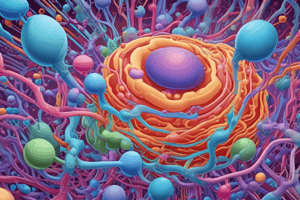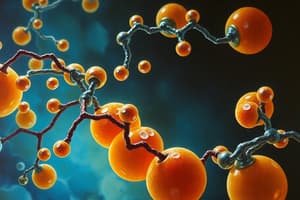Podcast
Questions and Answers
What is the function of transport in membrane proteins?
What is the function of transport in membrane proteins?
- To exchange molecules across a membrane (correct)
- To transmit signals
- To maintain cell shape
- To facilitate enzymatic reactions
What is enzymatic activity in membrane proteins?
What is enzymatic activity in membrane proteins?
A protein built into the membrane with an active site exposed.
Define signal transduction.
Define signal transduction.
The linkage of a mechanical, chemical, or electromagnetic stimulus to a specific cellular response.
What is meant by cell-cell recognition?
What is meant by cell-cell recognition?
What does intercellular joining refer to?
What does intercellular joining refer to?
What is the function of attachment to the cytoskeleton and extracellular matrix (ECM)?
What is the function of attachment to the cytoskeleton and extracellular matrix (ECM)?
Flashcards are hidden until you start studying
Study Notes
Functions of Membrane Proteins
-
Transport
- Facilitates the movement of molecules across cell membranes, allowing for exchanges of kinetic energy and momentum.
-
Enzymatic Activity
- Membrane proteins possess an active site that is exposed, enabling them to catalyze biochemical reactions within the membrane.
-
Signal Transduction
- Involves the process where cells convert mechanical, chemical, or electromagnetic signals into specific cellular responses, playing a critical role in communication.
-
Cell-Cell Recognition
- Allows cells to identify and differentiate between neighboring cell types, crucial for proper functioning; carbohydrates attached to proteins play a key role in this recognition.
-
Intercellular Joining
- Engages membrane proteins from adjacent cells to bind together, forming structures like gap junctions and tight junctions, which are vital for tissue integrity.
-
Attachment to Cytoskeleton and Extracellular Matrix (ECM)
- Provides structural support and helps maintain the shape of the cell by anchoring it to the cytoskeleton and ECM.
Studying That Suits You
Use AI to generate personalized quizzes and flashcards to suit your learning preferences.




